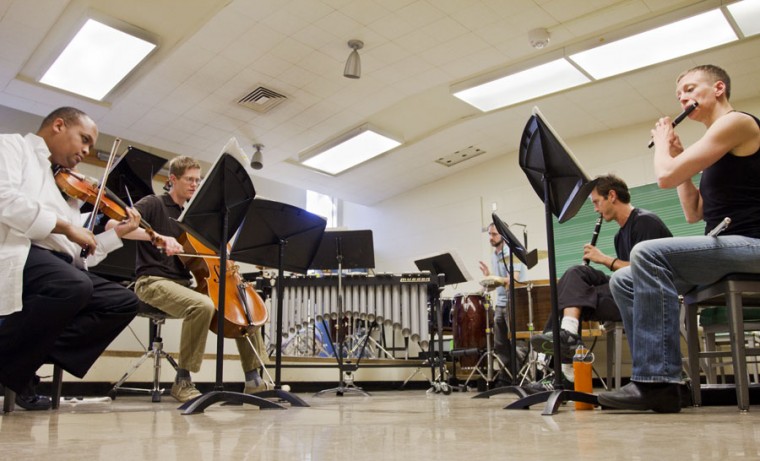New Millenium Series Gala to showcase ?hidden? talent
New Millenium:New music ensemble Citywater practices on Sunday for an upcoming concert in Capistrano Hall. Citywater will be performing songs by contemporary composers on April 15 at St. Paul?s Episcopal Church.:Chris Chiang – State Hornet
April 6, 2011
Any department at any university should be judged primarily on the skill and accomplishments of its students. The performers at Tuesday’s faculty gala would confirm this, if asked; they are the teachers who make Sacramento State’s music program tick. Tuesday, though, is all about them.
The event, part of the music department’s New Millennium Series, will showcase a handful of acts, all of them featuring at least one current Sac State faculty member. Cello professor Andrew Luchansky said students have reason to be excited about this spectacle.
“It is a rare and special opportunity to hear Sacramento State’s extraordinary faculty performing right here on campus,” he said. “It will be a fun, exciting and relaxed atmosphere.”
Professor Tim Stanley will perform at the gala with his group Citywater. Stanley works with a program called the String Project, which brings young musicians from elementary and middle schools to Sac State for intensive training. He said his main goal is to give promising performers a path to playing professionally.
Stanley said Citywater, recently named Sac State’s “ensemble in residency,” plays mainly chamber music written in the past 20 to 30 years. On Tuesday, the group will present American composer Pierre Jalbert’s “Visual Abstract,” which Stanley described as having “some interesting musical ideas that really can only be late 20th and early 21st century ideas.”
He said the first movement is called “Bells,” and calls for all six instruments to mimic the sound of a bell in its own way. At the same time, a recording will run the sound of a bell backwards, which means instead of an impact followed by a fading ring, it will be the other way around. Also notable is the third movement, titled “Dance.” Stanley said this may be tongue-in-cheek on the part of the composer, since the movement’s irregular time signatures make it virtually impossible to dance to.
Drums professor Dan Kennedy will also be on hand, performing with his group the Rootstock Percussion Trio. Kennedy is in his 18th year at Sac State, and he is joined in his band by Chris Froh, a professor at UC Davis, who teaches part time in the percussion studio at Sac State.
Rootstock will also perform a contemporary piece, “Parade” by Chinese composer Wenjing Gou. The selection is played on an instrument called Chinese opera gongs, which lies flat on a table and produce different tones depending on where they are struck. Kennedy described the tones created by using different implements to strike the various spots as “sonically colorful.”
“I think it will open peoples’ ears to the new directions that percussion is going,” he said.
Sac State violin professor Ian Swensen is also slated to perform Tuesday. He will bring along pianist Eric Zivian, and they will be playing “Sonata for Violin and Piano in A Major” by Dutch composer Cesar Franck.
Swensen has been at Sac State for eight years. Luchansky, an acquaintance of Swensen, asked him to fill in at the last minute for a professor who had left mid-semester. Swensen was raised around music, as his mother played piano and his father was a clarinet instructor at The Julliard School.
He has toured the world with various musical groups, and has played in many unusual venues, including the Moab Festival in Utah, which takes place in a grotto along the Colorado River. He remembers one show in Japan as particularly serene, “during a time of year when the rice fields all turn bright gold.”
“I remember playing at a monastery there, (the) people all sitting on the floor,” Swensen said. “With rice paper walls and bamboo floors, it was just really beautiful.”
This summer, Swensen plans to teach young children at a conservatory in Shanghai.
Perhaps among the most excited to see Swensen play is Citywater’s Stanley. He described Swensen in particular as one of the best violinists in the world.
“Every time I hear (Swensen) play, I walk away just astounded at what he can do on the violin,” Stanley said. “The fact that I keep getting to hear him play because he is at the same school as me, it is just the fates really smiling down on me.”
Stanley said just because an event is close by and inexpensive does not mean it will not be worth seeing. He said this show will provide students with an opportunity to see high-caliber talent they may not have known lives in their own backyard.
“It is going to be world class,” he said. “It is almost silly not to go.”
Alex Grotewohl can be reached at [email protected]
















































































































































